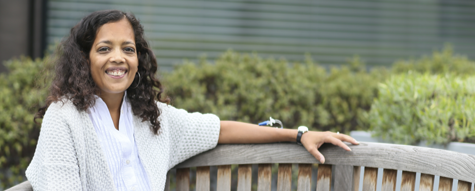UCLH is, and always has been, a big part of Suraiya Jones’ life. Diagnosed with Thalassaemia intermedia as a young child, she first came to the hospital aged five. She’s been under the care of UCLH ever since, giving birth to her two children here.

Thinking about starting a family of their own, Suraiya’s parents were screened after deaths of children in their extended family - and were given the all clear. Suraiya’s older sister was fine, Suraiya, it turned out, was not and was diagnosed with thalassaemia after becoming very unwell on a family holiday. Suraiya was admitted to UCLH to have her spleen removed when she was five years old. This was the first of many stays at UCLH and she spent a lot of her childhood in and out of hospital as she was susceptible to infections and illnesses because of her condition. Even if she went to her local hospital she would often end up at UCLH. “Quite often I would become unwell, go to my local hospital, but would be transferred to the UCLH teams because they knew the details of my case, which were very complex” said Suraiya.
"Quite often I would become unwell, go to my local hospital but would be transferred to the UCLH teams because they knew the details of my case, which were very complex."
As she grew older, Suraiya continued to have spells in hospital although, thankfully, they were less frequent. She currently comes to UCLH every three weeks for a cross match and two units of blood.
Suraiya has seen a lot of changes over the years at UCLH – most for the better! “The re-organisation of services and new buildings make a huge difference” says Suraiya. The University College Hospital Macmillan Cancer Centre, where Suraiya has treatment for her thalassaemia opened in 2012. “It’s much more convenient now” says Suraiya, “I have my treatment and my appointments with the thalassaemia doctors, including the cardiologist, in one single building. If I need to see other doctors, appointments are often at University College Hospital which is a three minute walk away. This is much less time-consuming and allows me to fit my treatment in around my life, rather than my treatment dictating my life, which is very important to me as a busy mum of two young boys”. The environment is also much improved, “the treatment room is light, airy and much more spacious and we have Wi-Fi which passes the time a bit more easily”.
"The staff are fantastic – and the nurses are always ready, they’ve always got smiles on their faces"
The other main change is the development of the role of the clinical nurse specialists (CNS) which, Suraiya, says has had a very positive effect on her experience of being a patient here. “The CNS are fantastic – I am treated by different teams from different specialties and my CNS, Bernadette, helps co-ordinate everything for me. She is just fantastic and is my first port of call if I need anything, even just to chat about any worries I have.
Coming to hospital every three weeks means that Suraiya is very familiar with the staff and patients at the unit. “The staff are fantastic – and the nurses are always ready, they’ve always got smiles on their faces. They came to see me at the Elizabeth Garrett Anderson Wing when the boys were born, which shows how much they genuinely care. It’s real team work in action – from the receptionist Olu who fixes my appointments, even if there has been a mix up with my appointments, to the nurses providing my care, to the doctors making key decisions about my medications – it all comes together and helps me live my life with my condition”.
“What would I say about UCLH? Quite simply I wouldn’t be here without UCLH. It’s saved my life, more than once, and allowed me to live the life I have now.”



